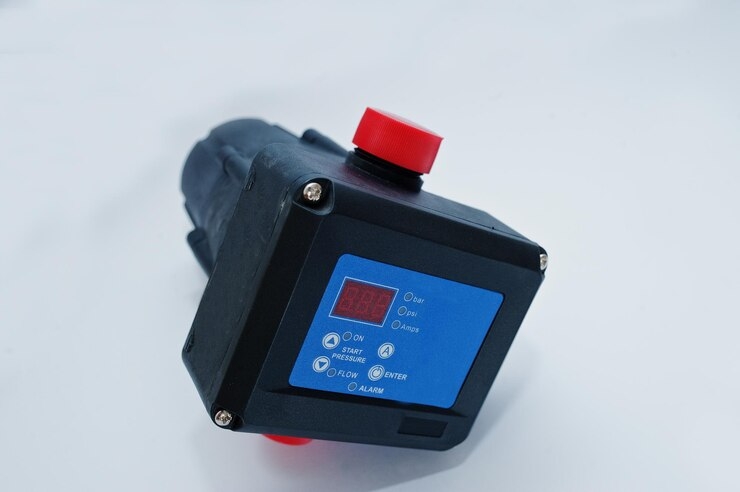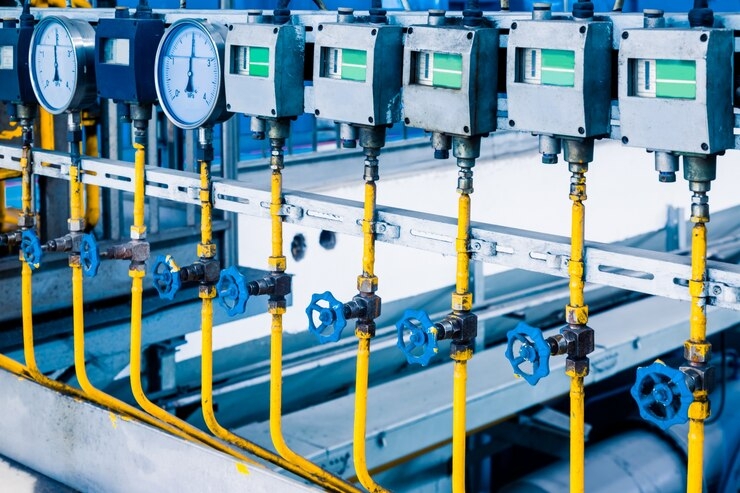How Do Flow Sensors Improve Safety and Prevent Equipment Failures in Industrial Applications?
Published on by David Cannon in Technology
In sectors where machinery and fluids are constantly moving, safety is critical. Flow sensors play an important role in maintaining safety and preventing equipment breakdowns. This article describes how these devices help to maintain safety standards and operational reliability in industrial environments.
Flow sensors actively monitor fluid flow and act as alert guardians to ensure that processes run smoothly. They detect anomalies, such as blockages or pressure changes, and immediately notify operators to avoid equipment malfunctions and production disruptions.
These Flow sensors are crucial instruments for preserving security and reliability in industrial operations. Their proactive monitoring of fluid flow and early detection of possible problems contribute to the smooth functioning of industrial processes.
What are Flow sensors?

Flow sensors are devices that monitor the flow rate or quantity of a fluid passing through a given point in a system. They are widely used in a variety of industrial, commercial, and scientific applications to monitor and control the flow of liquids or gases.
Flow sensors work on various concepts depending on their type and design, such as sensing fluid flow velocity, pressure fluctuations, or temperature variations. These sensors are essential in a variety of industries, including automotive, aerospace, pharmaceuticals, water treatment, and manufacturing.
Importance of monitoring liquid & fluid flows in various industries
Monitoring liquid or fluid flows is an important element of operations in many industries. Whether in manufacturing, chemical processing, food and beverage production, or wastewater treatment, precise fluid flow measurement and control are critical for guaranteeing efficiency, product quality, and safety compliance.
Many industrial processes rely on the transportation of liquids and gases through pipelines, tanks, and gear. Monitoring these flows helps industries to optimize operations, reduce waste, and increase productivity. Understanding and managing fluid flows allows enterprises to increase the efficiency of their manufacturing processes.
Furthermore, monitoring fluid flows is critical for protecting equipment from damage. For example, in cooling systems, insufficient flow rates can cause overheating and equipment failure . Industries that continuously monitor flows can spot difficulties early and take immediate action to avoid costly downtime and repairs.
Types of Flow Sensors used in industry
There are various types of Flow sensors used in the industries to measure fluid & liquid flow accurately. These sensors use various operating principles to cater to a variety of industrial applications.
- Turbine Flow Sensors: Turbine flow sensors have rotating blades that spin when fluid flows through them. The rotor's speed corresponds exactly to the flow rate, allowing for precise measurement. Chemical processing and water distribution systems are among the many applications that require high accuracy.
- Ultrasonic flow sensors: These sensors use ultrasonic waves to measure fluid flow rates. Flow velocity is calculated by examining the time it takes ultrasonic signals to move upstream and downstream. Ideal for non-invasive measurements and in corrosive or abrasive fluid conditions.
- Thermal Mass Flow Sensors: These sensors work on heat transfer principles, heating a portion of the fluid and measuring heat dissipation as it passes through a heated sensor. Heat dissipation rate is directly proportional to flow rate, making them appropriate for gas flow measurement in HVAC systems and industrial gas monitoring.
- Vortex Flow Sensors: These sensors estimate flow rate by utilizing the vortices generated by a bluff body during fluid flow. Vortex frequency matches to flow velocity, allowing for accurate and consistent monitoring. Frequently used in steam flow measurement and industrial process control applications.
Industries can achieve precise and reliable monitoring of fluid flow rates by utilizing various types of flow sensors, resulting in process optimization and operational efficiency.
What is the role of Liquid Flow Sensors in Enhancing Safety?

Liquid flow sensors play an important role in improving safety in industrial environments. Liquid Flow Sensors play an important part in safety protocols by connecting with shutdown systems and ensuring compliance to industry requirements. Let's look at how they help in improving safety through specific functions:
1. Monitoring and controlling fluid dynamics
- Detection of flow inconsistencies: Liquid Flow Sensors continuously monitor fluid flow rates, identifying any irregularities or deviations from predicted patterns. This early detection helps to avoid possible difficulties from becoming larger problems.
- Prevention of leaks and spills: Leaks and spills can be prevented by continuously monitoring fluid flow rates with Liquid Flow Sensors. This proactive method enables timely intervention to mitigate potential hazards and reduce environmental impact.
2. Ensuring safe operating conditions
- Maintaining pressure within safe limits: Liquid Flow Sensors are essential for maintaining ideal pressure levels in systems. These sensors help to prevent excess pressure, which can cause equipment failure or safety issues.
- Preventing overflows and equipment stress: Liquid Flow Sensors help prevent overflows by keeping fluid levels within safe operating limits. Furthermore, by limiting flow rates, these sensors reduce the danger of equipment stress and damage caused by high fluid flow.
3. Contribution to safety protocols
- Integration with safety shutdown systems : Liquid flow sensors are frequently integrated into safety shutdown systems, where they play crucial roles in detecting abnormal flow conditions. When these sensors detect a potential safety danger, such as a sudden spike in flow rates, they initiate automatic shutdowns to prevent accidents or equipment damage.
- Compliance with Industry Safety Standards : Liquid flow sensors are critical in assuring compliance with industry safety requirements and regulations. By delivering accurate flow data and enabling real-time monitoring, these sensors assist industries in adhering to safety rules and maintaining a safe working environment for employees.
How do Fluid Flow Sensors prevent equipment failures?
1. Early detection of problems
Fluid flow sensors continually monitor flow rates and detect any abnormalities or departures from standard operating conditions. These sensors detect issues such as low flow rates, obstructions, or excessive pressure, allowing for early intervention to prevent equipment breakdowns.
2. Predictive maintenance
Fluid Flow Sensors make predictive maintenance possible by delivering real-time data on fluid flow rates and conditions. Maintenance teams can use sensor data to predict possible equipment breakdowns and plan preventative maintenance tasks accordingly. This proactive strategy helps to reduce unplanned downtime and extend the life of critical equipment.
Technological Advancements and Innovations in Flow Sensors
Fluid flow sensors play an important role in industrial operations because they monitor fluid flow rates and conditions, preventing equipment breakdowns and optimizing processes. Recent technical breakthroughs have boosted these sensors' capabilities, resulting in improved accuracy, dependability, and integration with IoT platforms. Let's look at some of the major advances in flow sensor technology:
1. Smart sensors and IoT integration
- Real-Time Data Monitoring : Fluid flow sensors continually monitor flow rates and detect any abnormalities or departures from standard operating conditions. These sensors detect issues such as low flow rates, obstructions, or excessive pressure, allowing for early intervention to prevent equipment breakdowns.
- Automated system adjustments based on data: Fluid Flow Sensors make predictive maintenance possible by delivering real-time data on fluid flow rates and conditions. Maintenance teams can use sensor data to predict possible equipment breakdowns and plan preventative maintenance tasks accordingly.
2. Increased sensor accuracy and dependability
- Advanced materials and technologies: Recent advances in sensor technology have resulted in higher accuracy and dependability. Flow sensors now use innovative materials and cutting-edge technology to improve performance and durability.
- Impact on Industrial Automation: The improved precision and dependability of flow sensors has a considerable impact on industrial automation. These sensors are essential in automated operations because they provide accurate flow data that allows for precise control and optimization.
Finally, fluid flow sensors play an important role in industrial operations by assuring safety, reducing equipment failures, and improving processes. By continuously monitoring and managing fluid dynamics, these sensors detect irregularities and enable early action to prevent possible problems from developing.
Taxonomy
- Water Monitoring
- Flow Meters
- water treatment